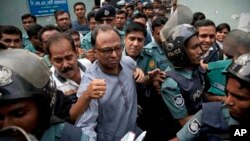“Freedom of expression” is one of those deceptively simple phrases that appears in many discussions on democracy, transparency, legislative fairness and good governance. However, it denotes a complex idea - one that is too often misunderstood, undervalued and dismissed.
Freedom of the press – journalists’ ability to access and report information in safety - is an important component of freedom of expression. As U.S. Ambassador to Bangladesh Dan Mozena stated recently, the United States regards freedom of expression, and the independent media as a subset, as a critical component of democracy.
The press plays an important role in informing the public and holding governments accountable. Governments that safeguard freedom of expression help to build a strong civil society and healthy discourse, which in turn leads to stable democracies and political and economic development. In countries where the press freedom of expression is curtailed, public discourse is stifled and accountability is weakened.
Bangladesh, a democracy with a predominantly Muslim population, has worked to protect both press and religious freedoms. The 15th Amendment of the Bangladeshi Constitution, which went into effect in 2011, states that although Islam is the state religion, the government will ensure “equal status and equal right in the practice of the Hindu, Buddhist, Christian and other religions.” This includes equal protections for expressions of faith.
In the 2012 Country Report on Human Rights Practices in Bangladesh, the U.S. Government noted that the Constitution provided for these rights, but the government sometimes failed to respect freedom of speech and press. There were some limitations on freedom of speech and perceived misrepresentation or defamation of Islam. Some journalists self-censored their criticisms of the government due to harassment. Other journalists self-censor due to concerns from advertisers and corporate pressures.
It is incumbent upon all of us to continue protecting the ability of journalists, including bloggers, to freely access and disseminate information to the public.
Freedom of the press – journalists’ ability to access and report information in safety - is an important component of freedom of expression. As U.S. Ambassador to Bangladesh Dan Mozena stated recently, the United States regards freedom of expression, and the independent media as a subset, as a critical component of democracy.
Some journalists self-censored their criticisms of the government due to harassment.
Bangladesh, a democracy with a predominantly Muslim population, has worked to protect both press and religious freedoms. The 15th Amendment of the Bangladeshi Constitution, which went into effect in 2011, states that although Islam is the state religion, the government will ensure “equal status and equal right in the practice of the Hindu, Buddhist, Christian and other religions.” This includes equal protections for expressions of faith.
In the 2012 Country Report on Human Rights Practices in Bangladesh, the U.S. Government noted that the Constitution provided for these rights, but the government sometimes failed to respect freedom of speech and press. There were some limitations on freedom of speech and perceived misrepresentation or defamation of Islam. Some journalists self-censored their criticisms of the government due to harassment. Other journalists self-censor due to concerns from advertisers and corporate pressures.
It is incumbent upon all of us to continue protecting the ability of journalists, including bloggers, to freely access and disseminate information to the public.






